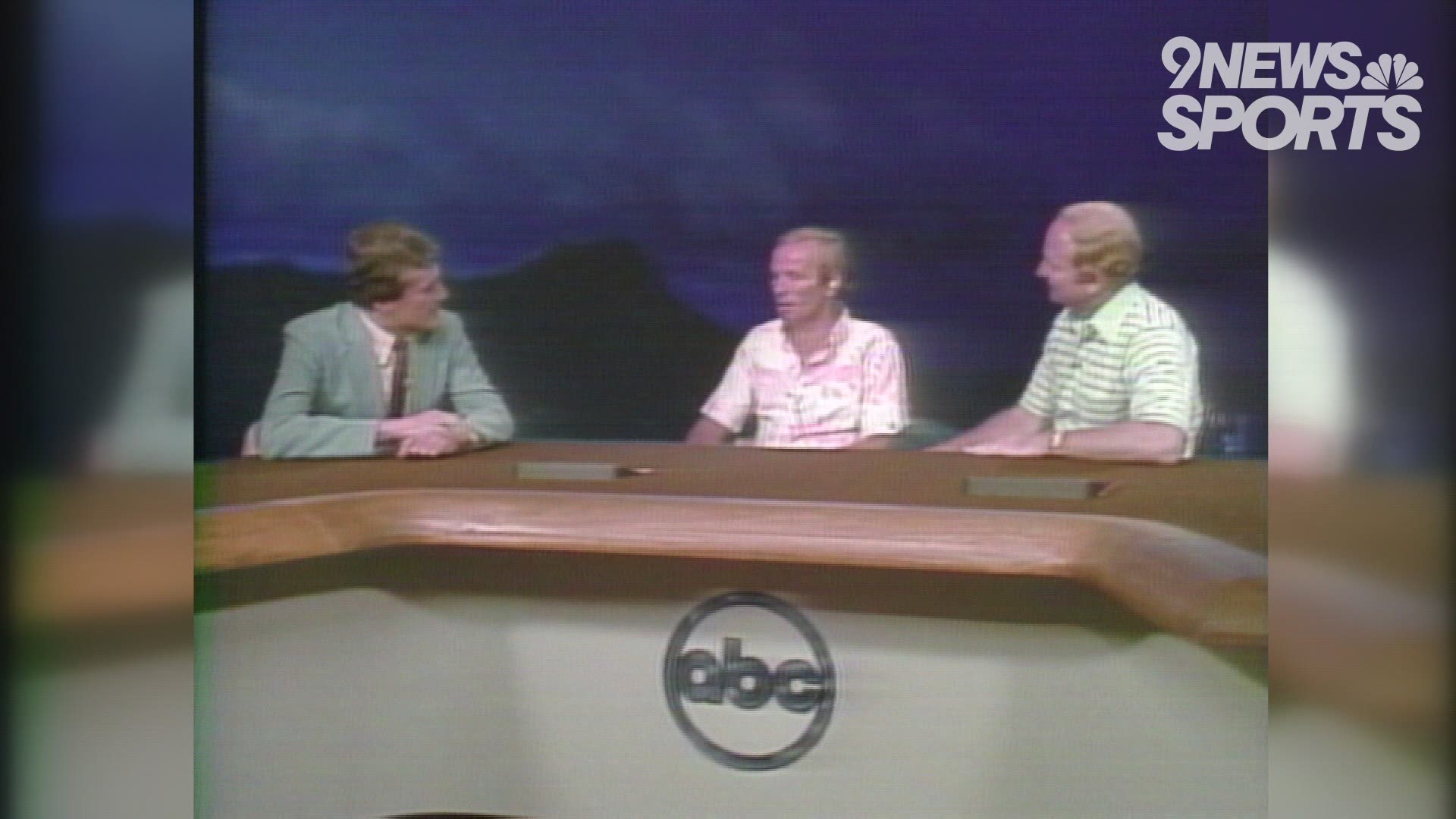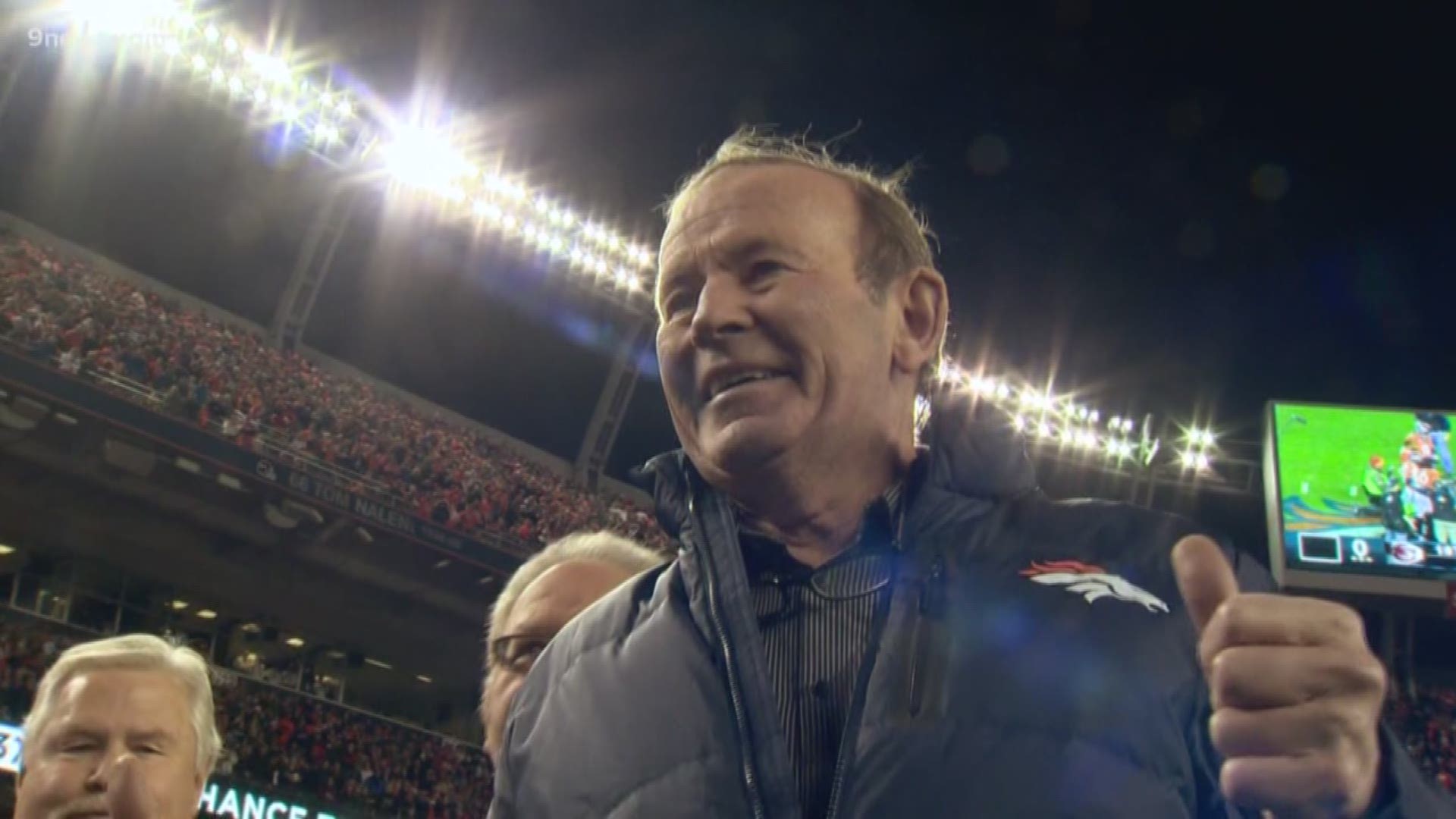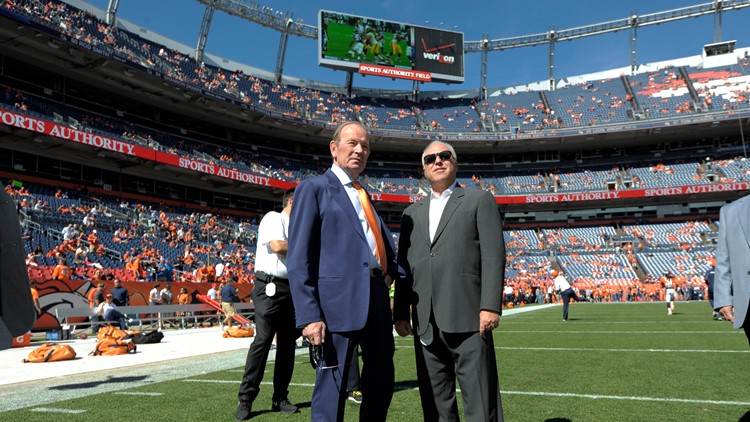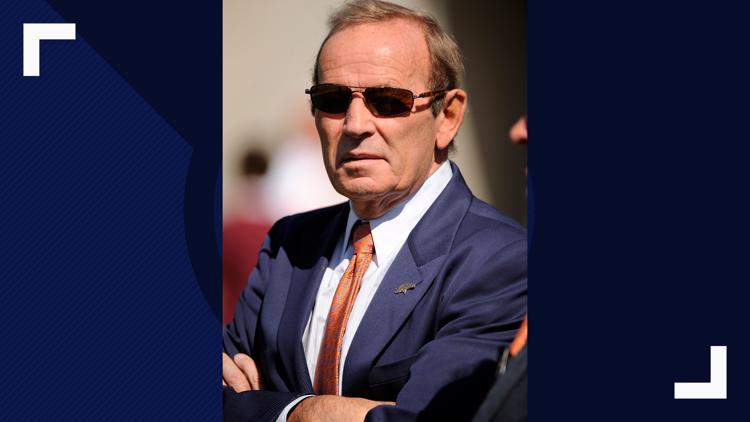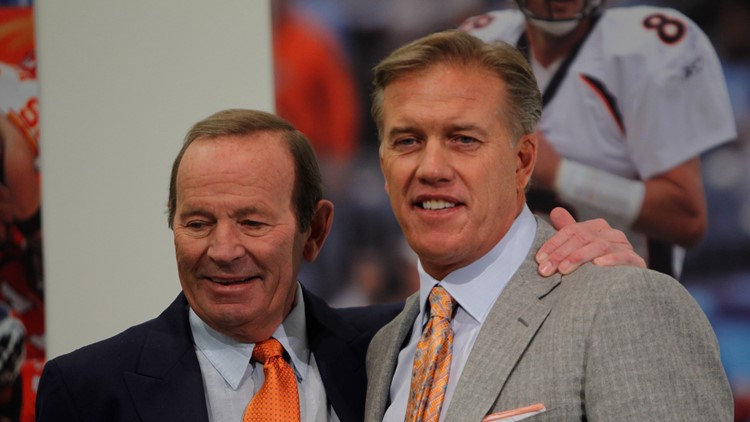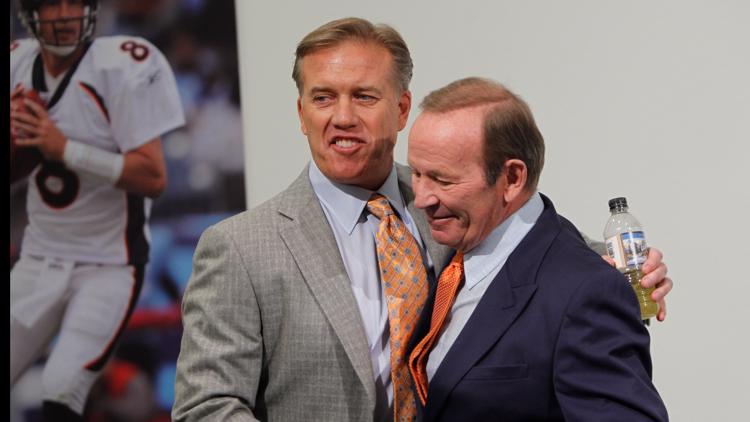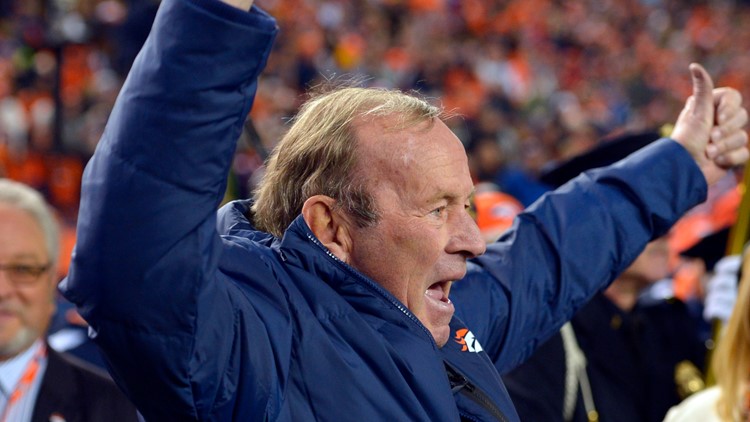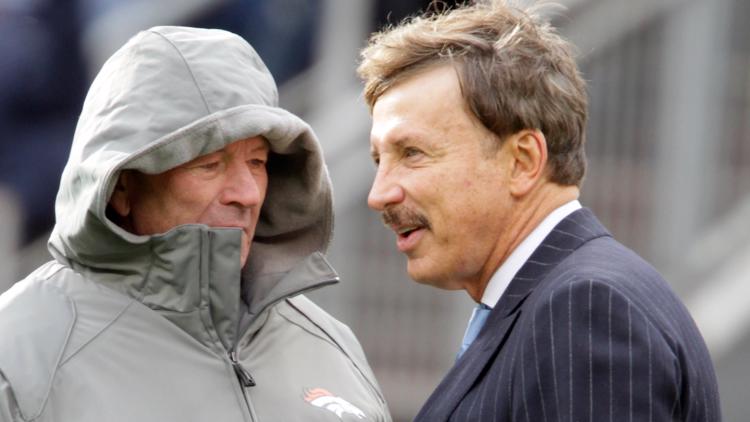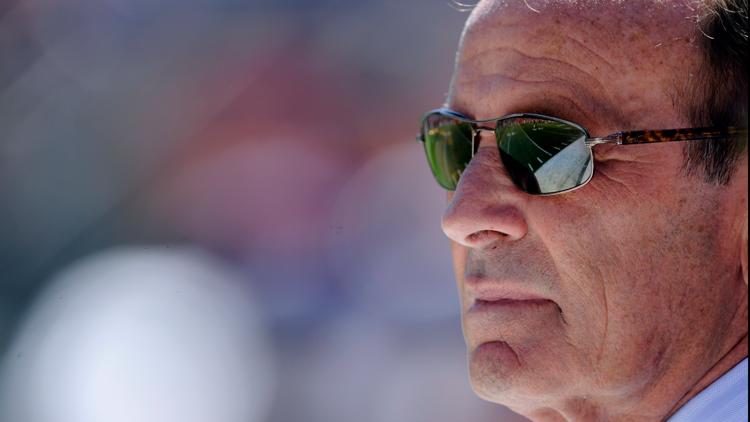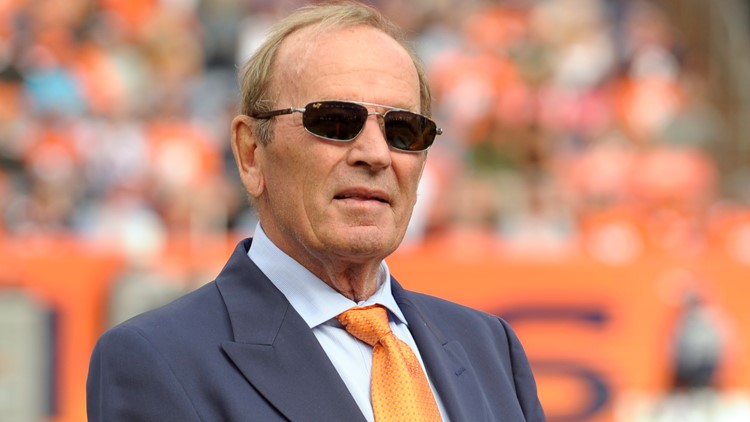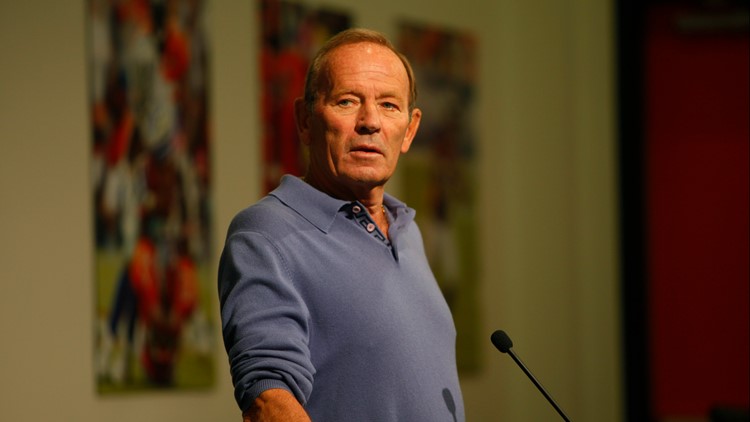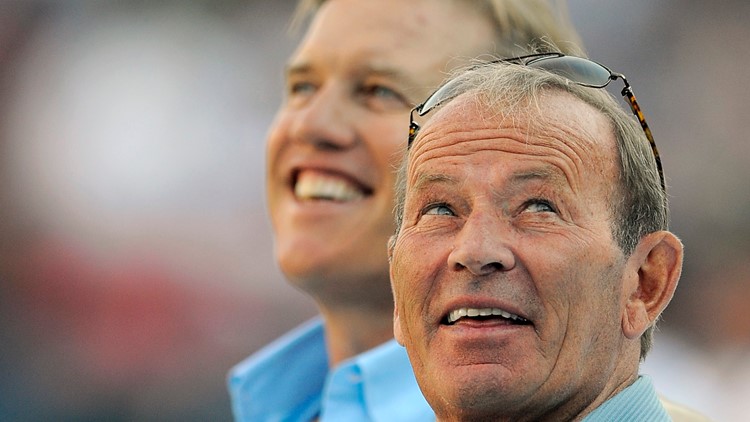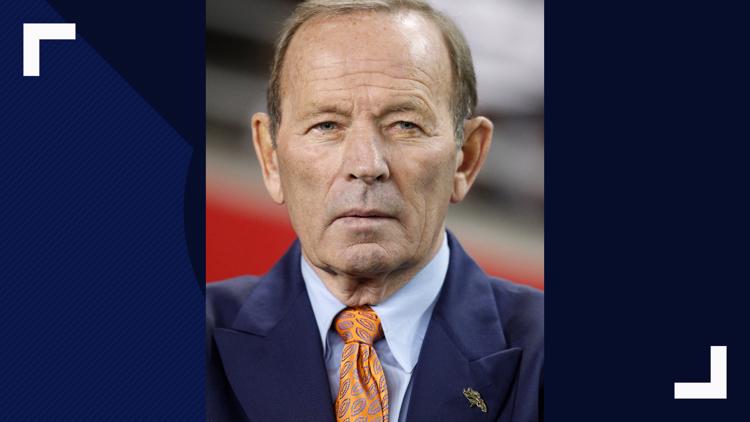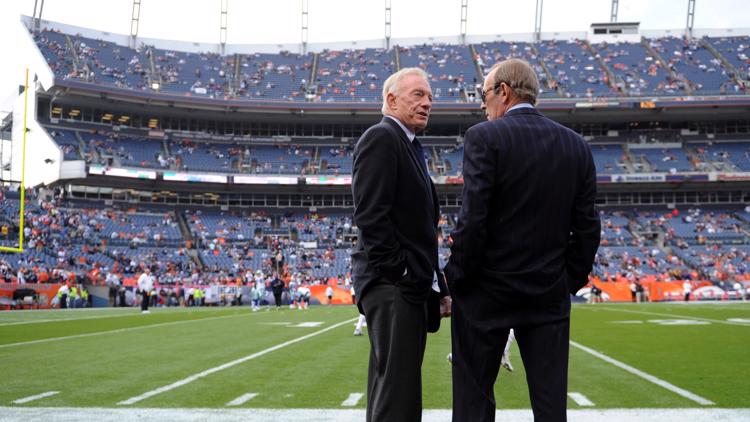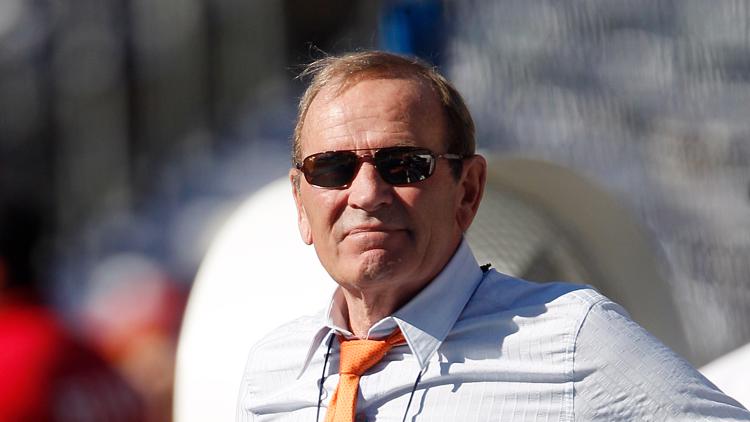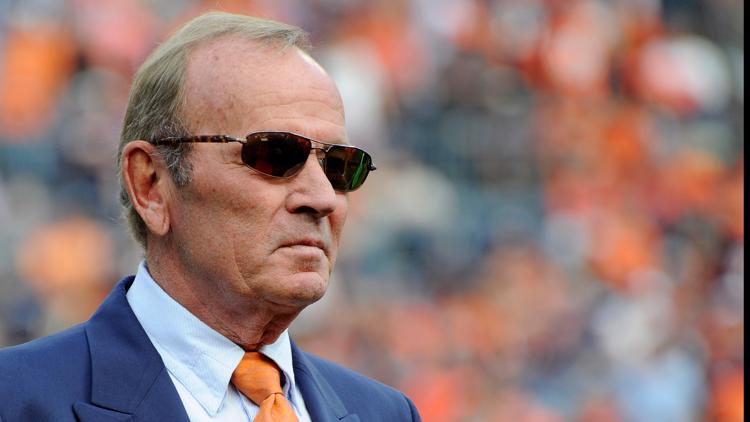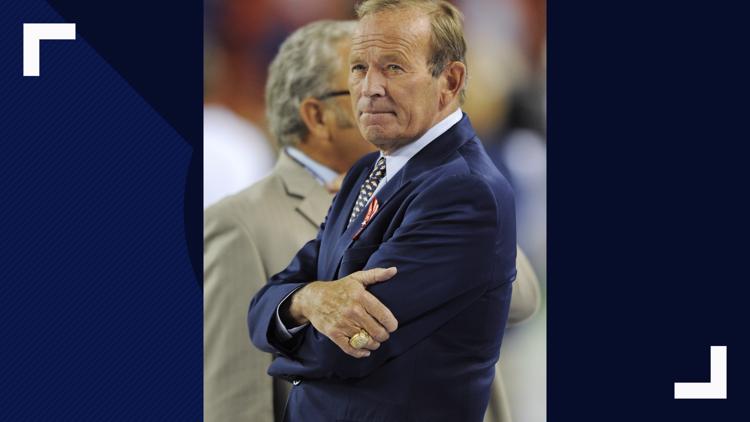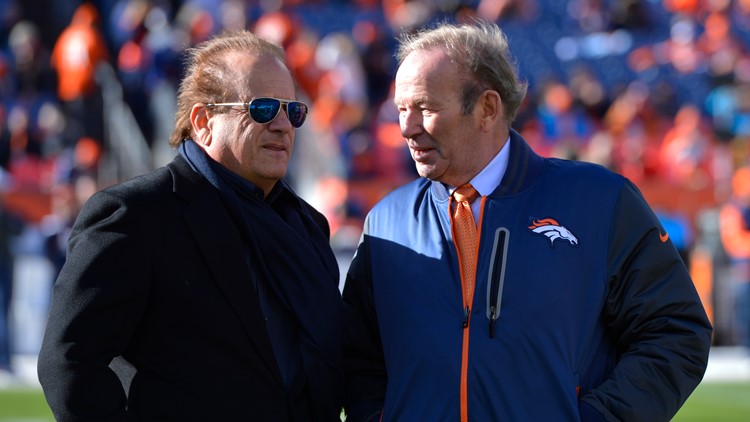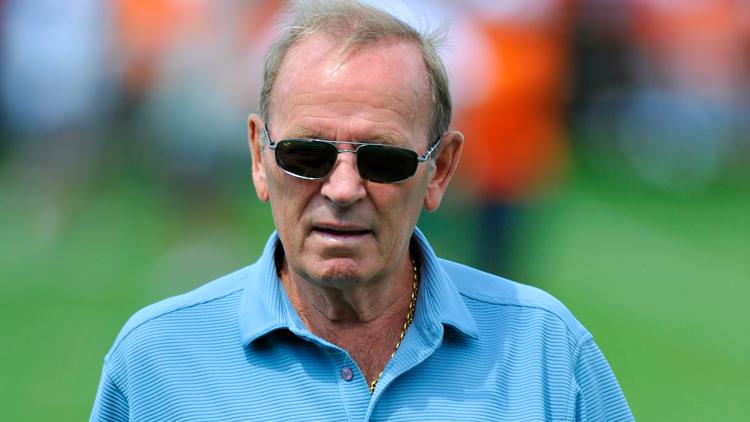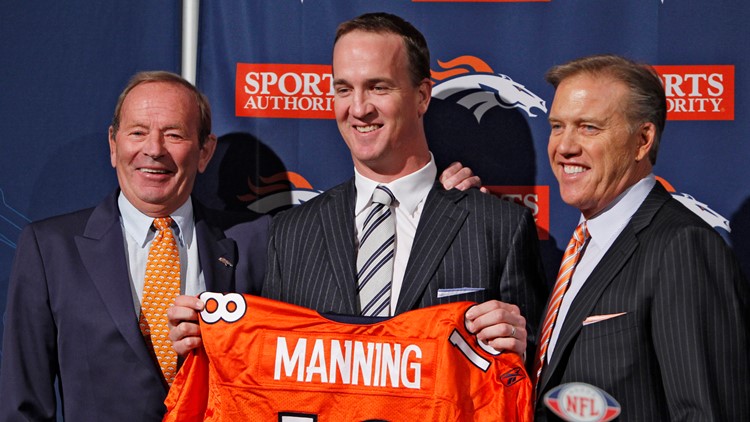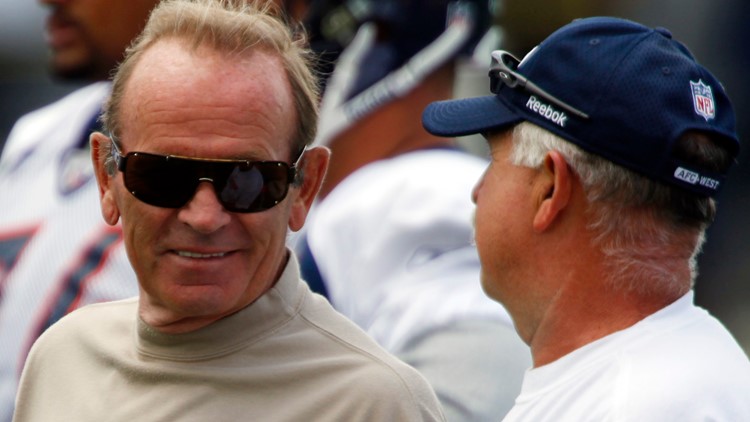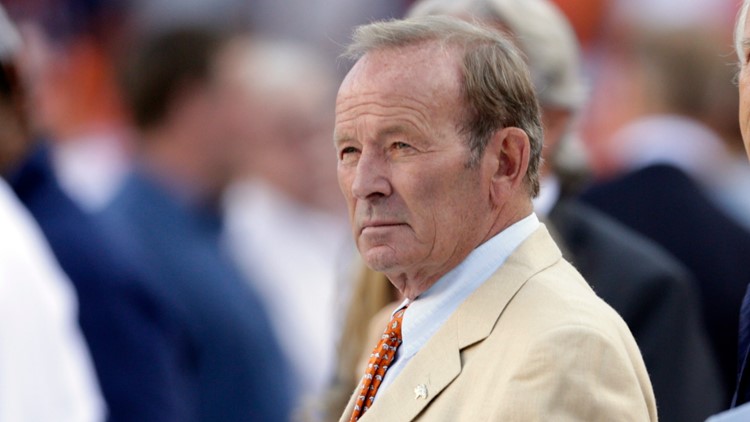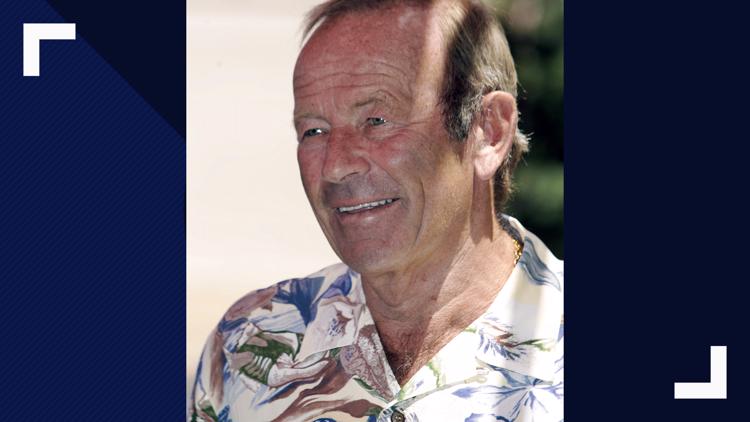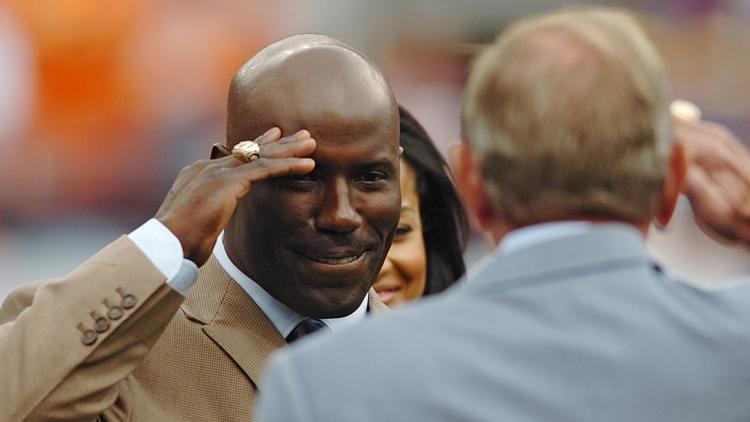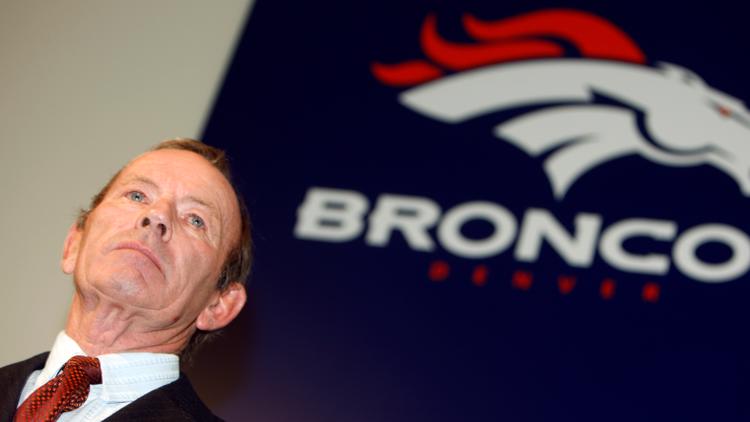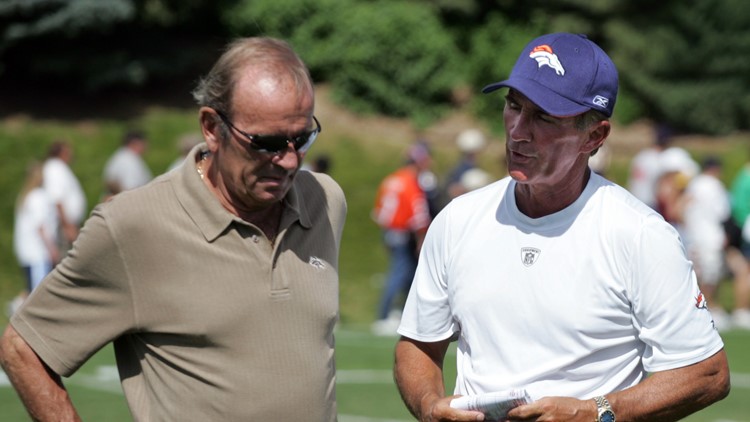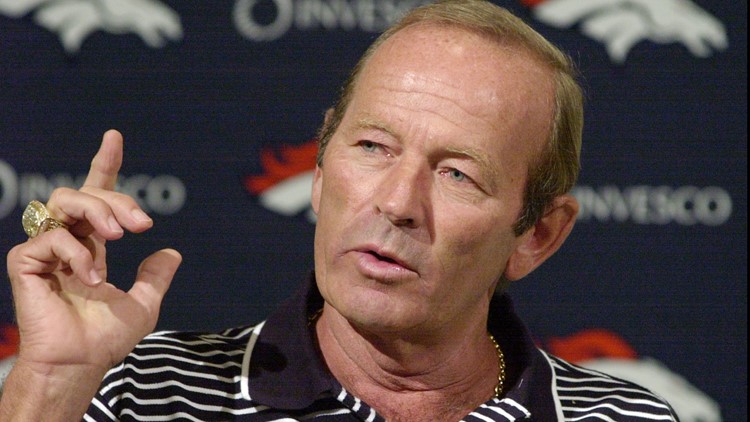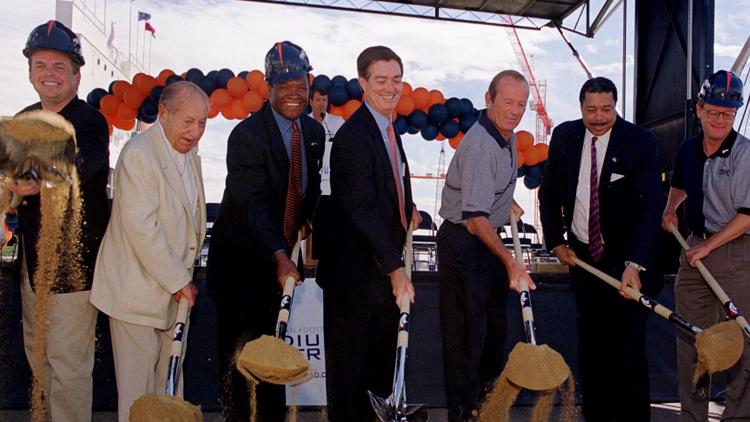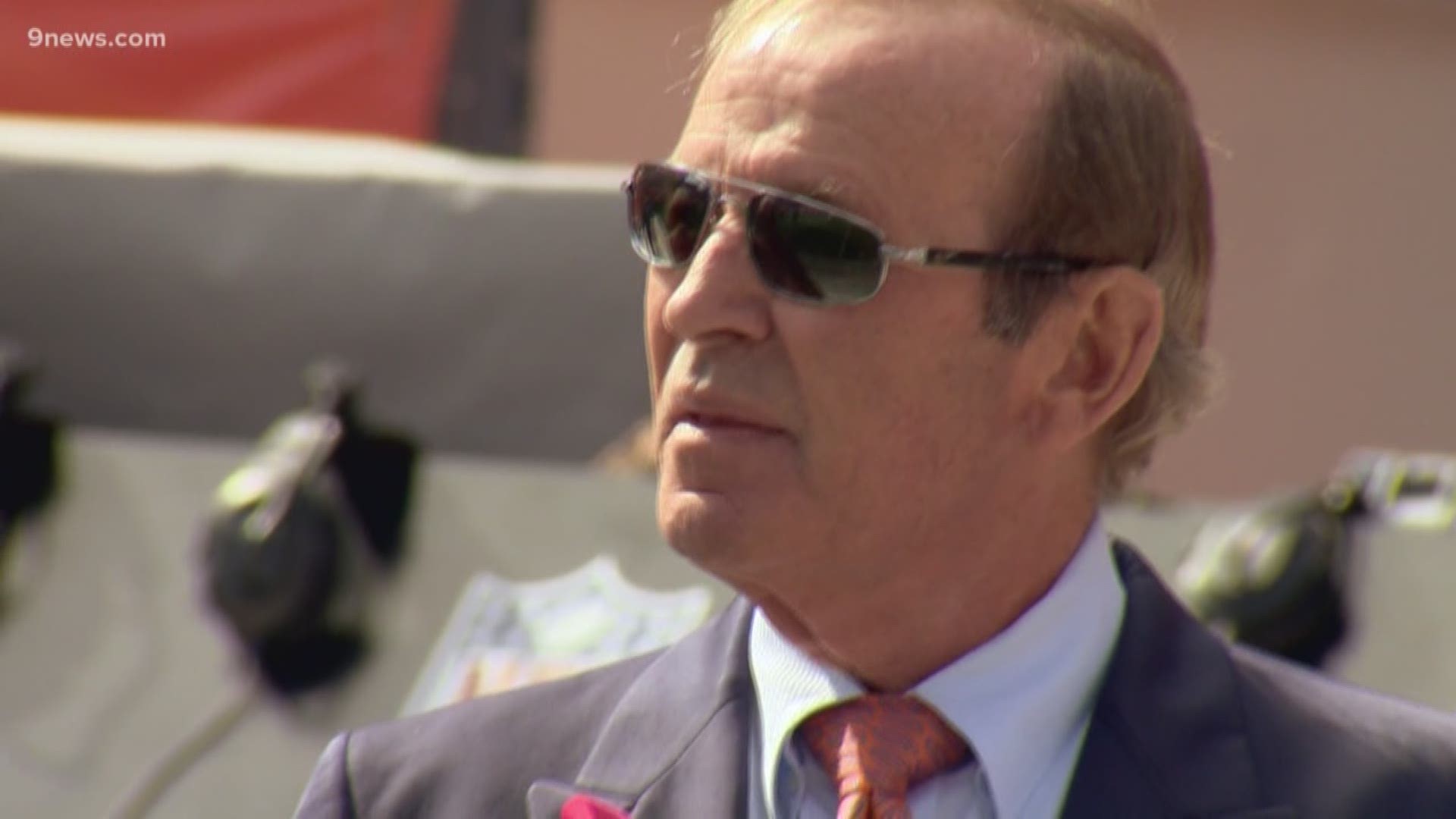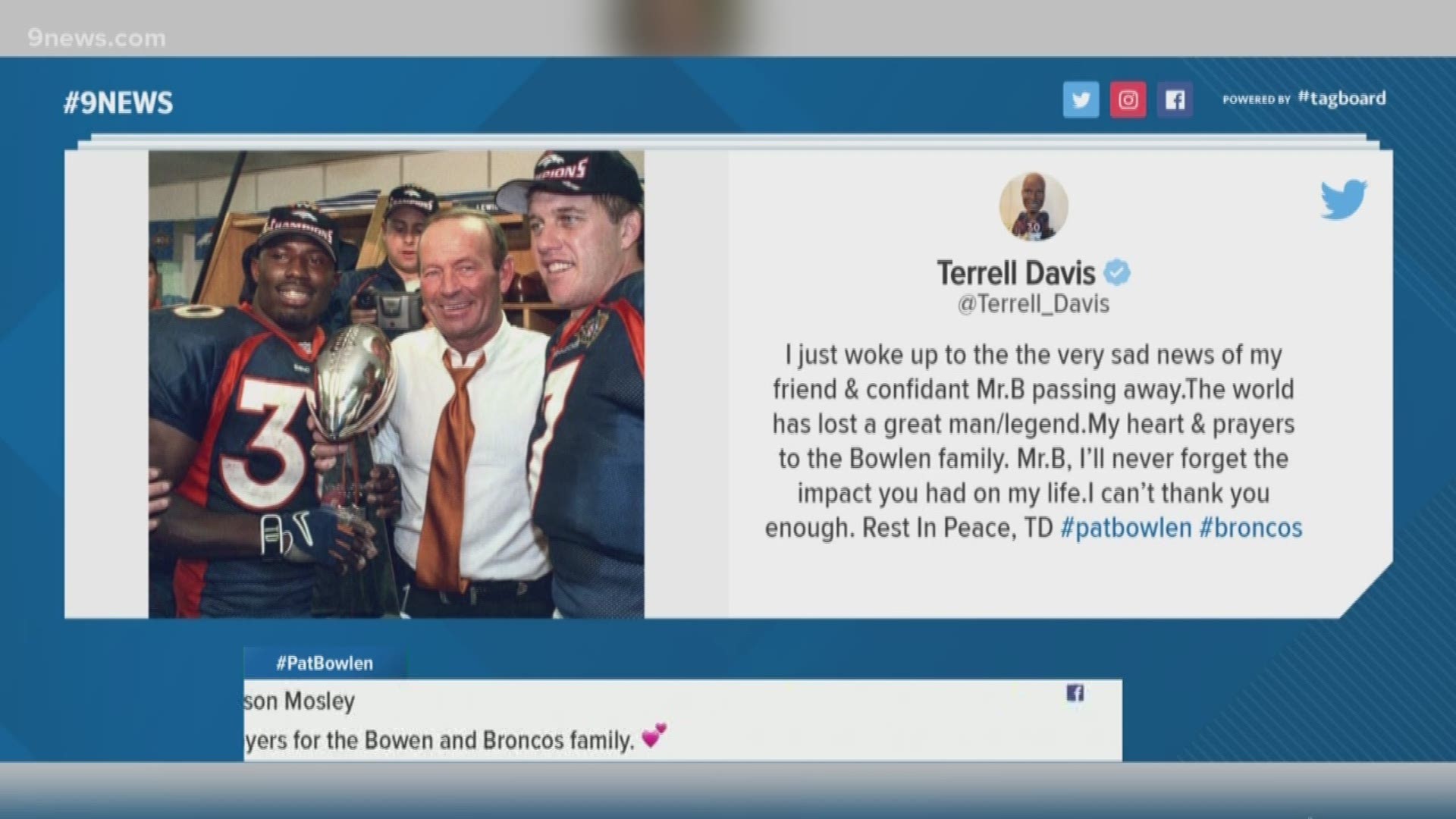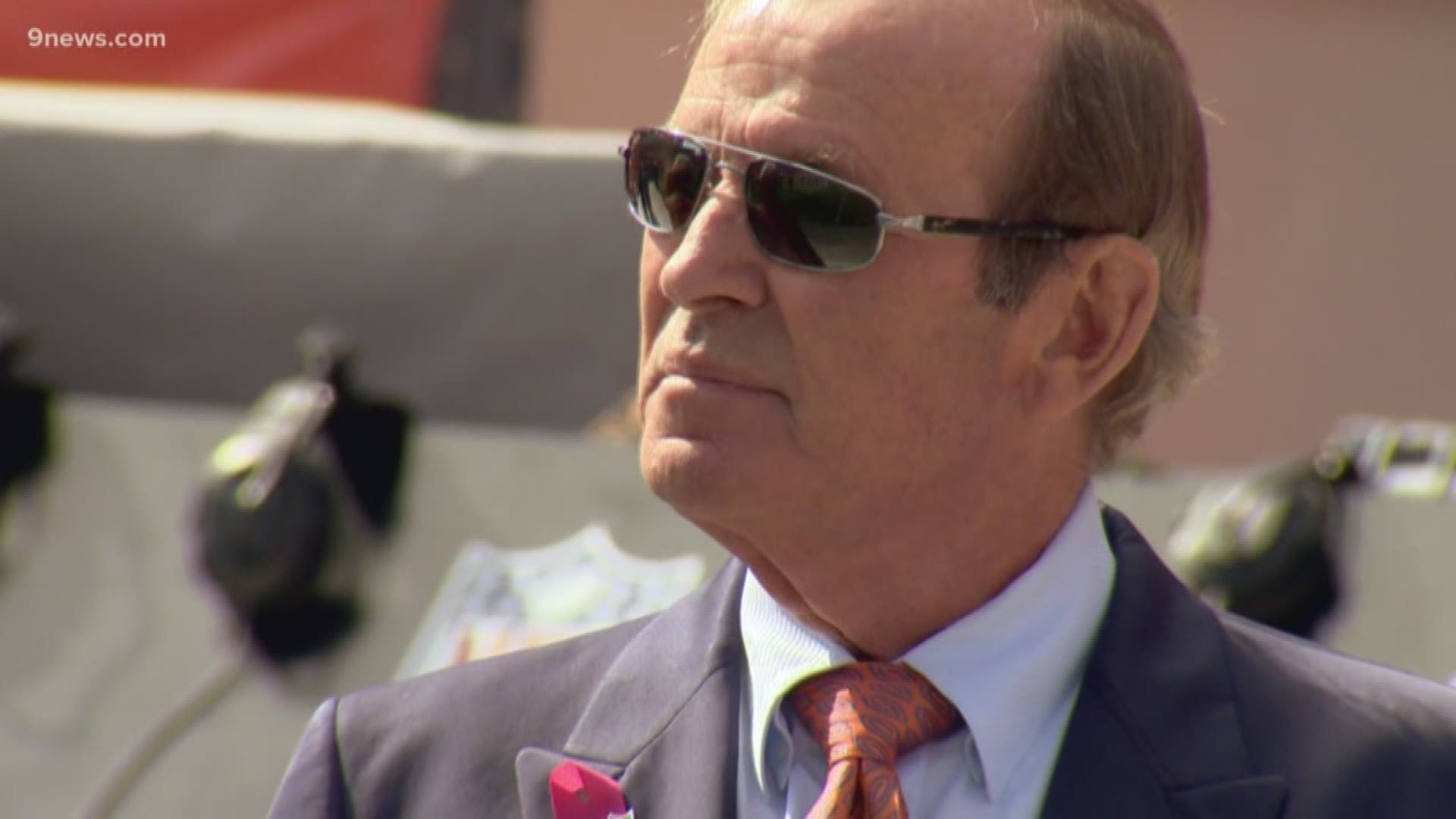COLORADO, USA — Pat Bowlen, the most successful owner in Denver sports history, has died at his Denver-area home late Thursday with his family at his side following a lengthy battle with Alzheimer’s disease, his family announced.
“His soul will live on through the Broncos, the city of Denver and all of our fans,'' the Bowlen family said in a statement. “Our family wishes to express its sincere gratitude for the outpouring of support we have received in recent years. Heaven got a little bit more orange and blue tonight.
> Join us on KTVD Ch. 20 on Tuesday, June 18 at 7 p.m. for a special look back at Pat Bowlen's legacy.
“Pat Bowlen had a competitive spirit with a great sense of humor. As fun-loving as he was, he always wanted us to understand the big picture. We will forever remember his kindness and humility.
“More important than being an incredible owner, Pat Bowlen was an incredible human being.”
Bowlen, who was 75, had been in charge of the Broncos from the time he and his siblings bought 60.8 percent interest of the team in March 1984 from Edgar Kaiser Jr. until it was announced on July 23, 2014 that he was transferring control of the team to his trust because of his Alzheimer’s diagnosis.
“This is a very sad day for our organization, our community and the National Football League,'' Broncos CEO and president Joe Ellis said in a statement. "Pat Bowlen was the heart and soul of the Denver Broncos. Not only was Pat a Hall of Fame owner—He was a Hall of Fame person. His competitiveness, kindness and humility are the qualities that I will always remember. Even during his battle with Alzheimer’s, you could still see that same strength and dignity in Pat that he brought to the office every single day for more than 30 years.
“Pat was the driving force in establishing the championship culture of the Broncos. He was also an extraordinary leader at the league level during a key period of growth. It wasn’t all about what Pat did as an owner, but it was the way he did it. The relationships he enjoyed with his players were real and sincere. Pat truly cared about the players in a very genuine way and always wanted them to get the credit. He preferred to be in the background and put every resource toward winning Super Bowls. With the fans, Pat felt in many ways that his team belonged to them and approached things with that in mind. There will never be another owner like Pat Bowlen. My heart goes out to his wife, Annabel, all of his children and all of our fans.”
PHOTOS | Legendary Denver Broncos owner Pat Bowlen through the years
The Broncos earned five Super Bowl berths in Bowlen’s first 15 seasons of ownership, then made it six in his 30th and final active season as owner in 2013. The Broncos made it seven Super Bowl appearances, and third Lombardi Trophy as NFL champions, with Bowlen as owner in 2015.
“Pat really made a big difference,” said Dan Reeves, the Broncos coach from 1981-92. “Not that Edgar Kaiser wouldn’t give you whatever you needed but Pat was more hands on. Edgar would stay away. Pat built us a new indoor facility (north of Denver).
“Before when the weather was bad we really didn’t have a place to practice. That helped us because Seattle was in our division at that time and they had an indoor stadium. It helped us practice against them by creating noise.’’
It’s fitting, then, that when the Broncos built a new indoor practice field at their training center in 2015, it was named The Pat Bowlen Fieldhouse.
MORE COVERAGE | Remembering Pat Bowlen
Bowlen was also the father of seven children – two daughters, Amie and Beth, from his first marriage, and five children – sons Patrick III and John and daughters Brittany, Annabel and Christianna – from his second wife Annabel. It was announced a year ago that Bowlen’s wife Annabel had also been diagnosed with Alzheimer’s.
“He was a great mentor,’’ Brittany Bowlen told 9NEWS during an interview in Atlanta on February 2, the day her father was elected into the Pro Football Hall of Fame as a contributor. “The lessons he taught us are guiding principles that we live by every single day.
“I was sitting on our couch late one night – that was one of our favorite things to do. We’d sit on this big, leather sofa. He’d smoke a cigar and we’d chat about life lessons.
“One day he laid out three for me. He said, ‘Brittany you have to understand. You have to understand the big picture. You have to understand people and where they come from. And you have to understand the business. And he said you have to have fun. Enjoy what you do. Live your life in a way that brings you joy.
“And the last one was, Brittany you have to kick ass and take names. I think that shows his competitiveness. He wanted some drive. He wanted us to do what was important to us. Those were the kind of moments we got to have with him as children. He raised us with purpose and I’m so blessed to have been raised by a father who did that.’’
Christianna said her father never failed to be there when his kids needed him most.
“He was the best dad ever,'' she said also in an interview with 9NEWS on February 2. "He would give me the most amazing advice. And even when I was getting bullied at school for my dyslexia, he would come to school and make everything better.
“It made him a little bit mad, but he said, ‘I have dyslexia as well and you have to be a fighter.’
“I think when we found out I had a brain tumor (five years ago) and pretty bad epilepsy, my dad had Alzheimer’s but he was still there for me. He told me, “You’re a fighter and you can do this.’’’
Bowlen will be inducted posthumously into the Pro Football Hall of Fame during ceremonies on August 2-3 in Canton, Ohio. His beloved Broncos will play in the Hall of Fame preseason game against the Atlanta Falcons in Canton on August 1. His children and members of the Broncos' team will be in Canton to accept his formal induction on Bowlen's behalf.
The Pro Football Hall of Fame has drawn controversy in recent years by saying family members of candidates elected posthumously would not receive the Gold Jacket or Hall of Fame ring. This policy came up when the late Kenny Stabler and Junior Seau were elected. However, Bowlen was alive when he was elected in February so there's a possibility he would receive both the Gold Jacket and HOF ring.
“He has always wanted others to have the spotlight and shine for what they do,'' Beth Bowlen-Wallace said in her interview with 9NEWS in February. "He would bring the best people in, step back, let them do their jobs to the best of their ability and when he would ask a question, it was not so much what can you do for me, it was what can I do for you to make your job easier, or to be the most successful. When you do that, you get the best out of people. And you get to reap the collateral benefits of looking good yourself.
“My father changed the league when it came to the broadcast committee. He has lived a life of integrity. He has cared, as an owner, more about this game than any modern-day owner I believe that we know. He has cared about this game for the league, not just the Denver Broncos or Pat Bowlen. His emphasis has always been on strengthening the league.’’
Each day when he showed up at Broncos’ headquarters, Bowlen’s first stop was in the trainer’s room where he would chat with head trainer Steve “Greek” Antonopulos, who is now in his 40th season with the team. The Bowlen family – he has seven surviving children from two marriages – chose Antonopulos to present Mr. Bowlen for the Pro Football Hall of Fame when the Broncos’ owner is inducted as a contributor in Canton, Ohio, on August. 3.
“The most important thing to him was to know how his players were,’’ Antonopulos said. “He cared about his players more than anyone I had ever been around. The sense of compassion he had. Yeah, sure, he was the owner and he had a stake in it, but he really cared about the personal lives, cared about their injuries.
“He wanted to know what was going on with them. It was just amazing over the years how he developed that compassion. It was there till the last time he was around the facility. It was a major deal to him.’’
Bowlen further demonstrated his care for the players in another area, this time where it matters most to a guy – his stomach.
“In the offseason, he’d buy lunches for our players so they didn’t have to go out and try to find food,” Reeves said. “We had it right there for him. A lot of little things that mean a lot. It was first class all the way. Pat never blinked on something if you told him about something that was the best thing for our football team. That’s one reason why we had the success that we had. We had some good players, no question, but we had the best scouting staff.

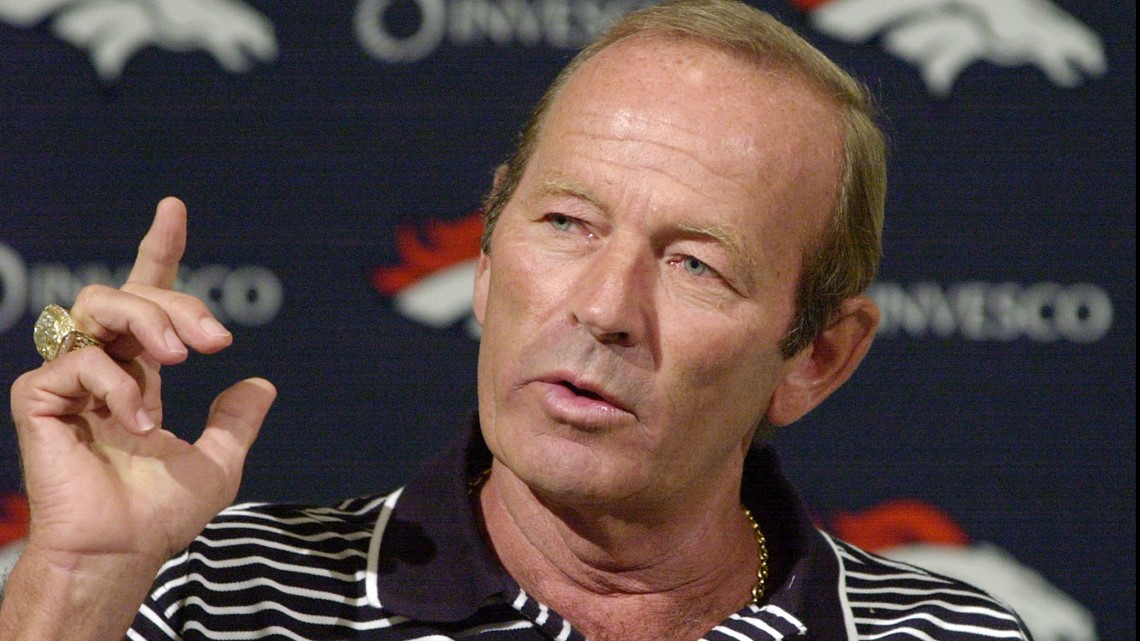
“Then we paid the players for offseason weight program, which created the ability for a lot of players who otherwise couldn’t stay in Denver, they could work out and get paid. Stay in Denver instead of going home in the offseason, that helped a great deal.”
The Broncos won their first-ever Super Bowls in back-to-back seasons in 1997-98, when Mike Shanahan was their head coach, John Elway was their superstar quarterback and Terrell Davis was the best running back in the NFL.
It was after the Broncos won their first Super Bowl by defeating the heavily favored Green Bay Packers in San Diego that Bowlen uttered his most memorable words as owner.
Holding up the Lombardi Trophy on the Super Bowl stage, Bowlen said into the public-address microphone: “There’s one thing I want to say here tonight and it’s only four words:
This ... one’s ... for ... John!”
Amid uproarious applause, Bowlen then handed the trophy over to his star quarterback John Elway.
“Yeah, I had no idea that was coming,” Elway said in ‘‘Mile High Magic” The 25 Greatest Moments in Denver Broncos History.’’ “I was a little embarrassed because everybody had put in so much work, it was nice to get over the hump but it was also nice for Pat to say that.”
Perhaps most astounding of Bowlen’s accomplishments as Broncos owner was the team suffered just five losing seasons during his 30 years of active ownership.
Compare that to Denver’s other three major sports franchises. The Rockies baseball team has endured 17 losing records in 26 seasons; the basketball Denver Nuggets have had 15 losing seasons in the past 29 years and even the hockey Colorado Avalanche had losing seasons in four of their previous 11 years.
“Pat didn’t have a plane, he didn’t have a yacht,” Shanahan said. “When he could afford it, he got a plane. But he never spent money crazy on himself.’’
When Bowlen bought the team, he inherited a strong fan base. The manic support began with the Orange Crush 1977 team and the acquisition of Elway the quarterback in 1983 added another layer of excitement.
Bowlen didn’t mess it up, though. He always considered himself more of a steward to Denver’s football franchise than the Broncos’ owner.
“This is their team,’’ Bowlen told the Denver Post during his final comprehensive public interview in August 2013. “It’s not my team. I think if you manage your club well, the fans appreciate that. They have a stake in it, too. They buy tickets.’’
In return, Bowlen gave the fans an insatiable will to win. He struck a delicate balance between loyalty to the men running his football department, and trying to quickly correct his mistakes.
He held on to Reeves for nine seasons – a long time for any NFL head coach, much less a situation where Bowlen stuck with the coach he didn’t hire. Remember, in a similar situation in Dallas, Tom Landry was immediately fired by a new owner named Jerry Jones.
Reeves hung in through a 5-11 season in 1990, and rewarded Bowlen with a 12-4 mark and appearance in the AFC championship game in 1991. An 8-8 record in 1992, though, moved Bowlen to make a change.
“When Pat fired me, he came in and I knew what he was trying to do, and I said, ‘Pat, look, I’ve been on this side where I had to call players in and tell them I wanted to make a change,’’ Reeves said. “I said, ‘Pat I know it’s tough, but I understand what you’re doing and it’s been great. I enjoyed coaching for you and I appreciate this opportunity because you could have picked somebody else. I enjoyed it. I just wish we would have won a Super Bowl for you instead of losing it (three times).”’
After firing Reeves following the 1992 season, Bowlen hired Wade Phillips essentially as an interim head coach until his preferred choice, Shanahan, gathered more experience as offensive coordinator of the San Francisco 49ers, who were then in their 15-year run of dominance.

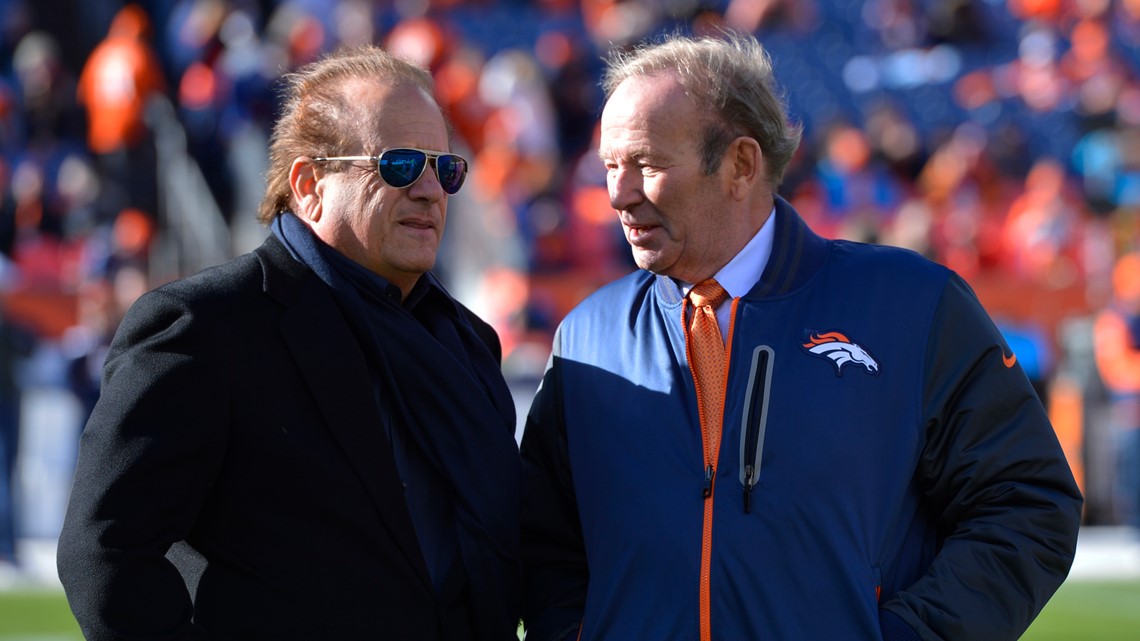
Phillips lasted two years, then Bowlen allowed Shanahan to take control for 14 years, from 1995-2008. Shanahan’s two Super Bowl titles early in his coaching era went a long way for the eternally grateful Bowlen, and for a while it did appear their business partnership might last forever.
But when Shanahan’s term fell into a rut of mediocrity from 2006-2008, Bowlen decided it was time for a change. He tried to make a home run hire with a bright, young coach in Josh McDaniels, who was coming off a successful run as New England’s offensive coordinator.
Instead, Bowlen struck out. After a 6-0 start, McDaniels’ Broncos lost 17 of his next 22 games. To his credit, Bowlen dismissed McDaniels less than two years into his coaching term. But with Bowlen admittedly struggling with short-term memory issues, he understood the need to step back from the team’s day-to-day operations and bring in someone he could trust to run football operations department.
And so Bowlen hired Elway. In January 2011, Bowlen put Elway in charge of football operations while elevating Joe Ellis from chief operating officer to team president.
Elway and Ellis formed a partnership that led to five consecutive AFC West Division titles in their first five seasons, plus two Super Bowl appearances and the Super Bowl 50 title.
The man behind Mile High
The Broncos represented only part of Bowlen’s work. As Shanahan was earning acclaim as a Mastermind in the mid- to late-1990s, Bowlen shifted his focus on league matters and campaigning local taxpayers for a new stadium.
Bowlen spent $5 million of his own money to vigorously campaign the Denver metro area to extend the .1 percent sales tax that helped fund baseball’s Coors Field so that it would finance 75 percent of construction costs for the Broncos’ new stadium. Bowlen and the Broncos paid for the other 25 percent.
The stadium campaign is when Bowlen was at his best.
“He was very, very shy,” Shanahan said. “I would tell people, really he’s a pretty good guy, and he’s just really shy. He got embarrassed when he didn’t know people’s name. I said, ‘Pat, people don’t care if you don’t know their name as long as you’re nice to them.’
“But I thought when we started going for the stadium he really started coming out of his shell. He’d meet people. But he had a cause to talk to people. I thought he did one heckuva job.’’
On Nov. 3, 1998, with his defending Super Bowl championship team 8-0 and on its way to a 13-0 record, 57 percent of voters agreed to fund 75 percent of what became a $400 million new stadium. Initially named Invesco Field at Mile High when it opened on Sept. 10, 2001 – the night before the 9-11 terrorist attacks on our country – the 76,125-seat Broncos’ stadium was renamed Sports Authority Field at Mile High in 2011.
It is now called Broncos Stadium at Mile High until the team and stadium district secure a new naming rights partner.
The Broncos have sold out 403 consecutive home games including playoffs, dating back to 1970, the NFL’s longest active streak. An even 300 consecutive sellouts have occurred since Bowlen bought the team prior to the 1984 season. He not only kept the Broncos relevant as he touched three generations, he helped usher the NFL from large planet within the sporting world to its own galaxy.
He served on the league’s labor and finance boards but it was his work as chairman of the broadcast committee that changed the way people view football. Specifically, football has been viewed on Fox since 1994 and Sunday night on NBC since 2006.
“It became so popular that it was sort of easy,’’ Bowlen said. “I don’t mean that in a braggadocios way and I say this sparingly: football is king. As long as we don’t step on our (toes) we’re fine.’’
That was Bowlen’s modest assessment of his contributions.
“There were four areas where the league was really transformed in the late ‘80s, early ‘90s,” said Paul Tagliabue, who started his long run as NFL commissioner in 1989. “Pat was the only owner who was heavily involved in all four areas.”
Television was one.
"I believe during his years as chairman of the TV committee, Pat Bowlen had more to do with how we watch football in America right now than anybody else in the league," said Dick Ebersol, the former chairman of NBC Sports. "His tough and direct manner made him someone who you just instantly had to respect.
"You can say he was the father of 'Sunday Night Football.' It never would have happened without him."
Another key league matter was the periodic labor unrest between the owners and players union. Bowlen was one owner whom labor leader Gene Upshaw trusted and respected. The result was mutually beneficial labor negotiations.
A third was building the NFL brand globally. In the 1980s and ‘90s, the Broncos played eight international games in six countries.
A fourth was the league’s movement to enhanced venues, for which the Broncos Stadium at Mile High was at the forefront when it opened in 2001.

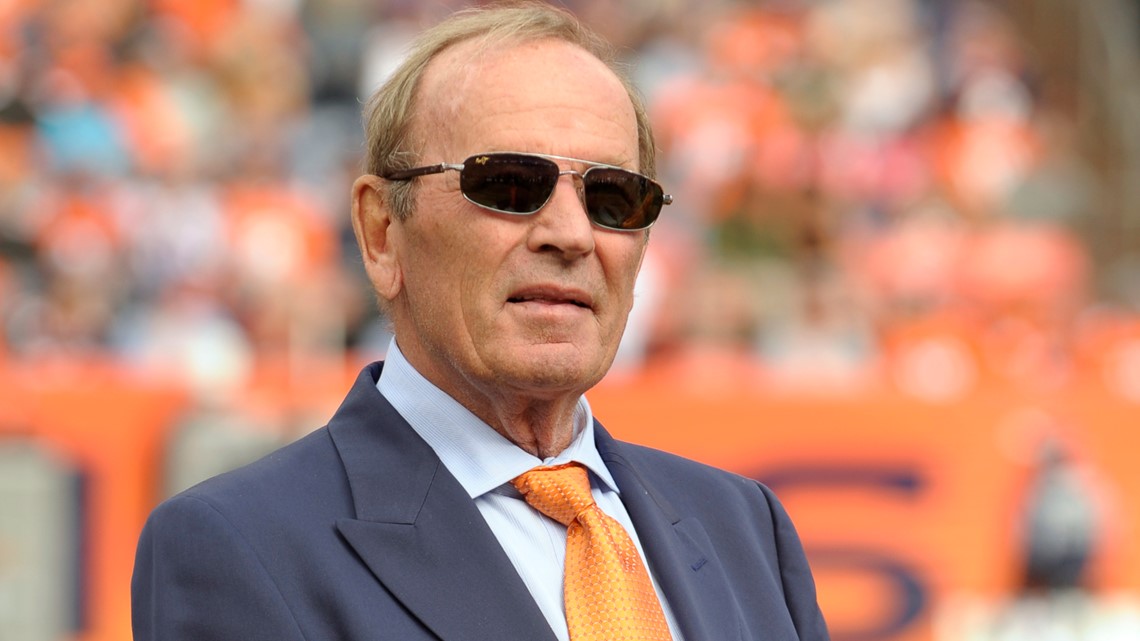
The path to becoming one of the NFL’s most successful owners
When Bowlen first bought the Broncos in 1984, he was often described as “Canadian Pat Bowlen,” which misrepresented his background. Patrick Dennis Bowlen was born Feb. 18, 1944 in Prairie du Chien, Wis., where he grew up and played hockey, football (starting receiver) and ran the 440 in track for a high school that no longer exists.
He then attended the University of Oklahoma, where he earned his business degree in 1965 and a law degree in 1968. At that point, he moved to Edmonton, Alberta where he became a lawyer for his father Paul’s oil company.
Through his father’s wildcatting success and his own resourcefulness, Pat Bowlen began building wealth through real estate, oil and gas.
In 1983, Bowlen starting looking to buy a professional sports franchise. He explored the NHL and Canadian Football League before he and Kaiser met through mutual friends.
In 1984, Bowlen, along with his brother John and sister Marybeth bought 60.8 percent of the Broncos from Kaiser, who was 42 at the time, for $51 million. It was a lucrative deal for Kaiser as just three years earlier, he bought the Broncos from Gerald and Alan Phipps for $30 million.
“The first time I met Pat, Edgar walked into my office and said I want you to meet your new owner,” Reeves said. “He introduced me to Pat. I didn’t know Edgar was thinking about selling it. And then your mind goes crazy: He bought the team, he must have somebody in mind he wants to coach it. You pay that kind of money it’s not like you thought about it a couple minutes ago. He was from Oklahoma and you’re wondering if he has some ties to some coach in Oklahoma or whatever.
“But we sat down and talked and he assured me he wanted me to be the head coach and he was looking forward to working with me. It was a great relationship. We were friends. Same age. He had a great family, I had a great family. It was one of the great times of my life. I was there 12 years and the part that Pat was there were the best years.”
A year after their initial purchase from Kaiser, the Bowlens bought the remaining 39.2 percent minority interest from John Adams and his attorney Timothy Borden for $20 million.

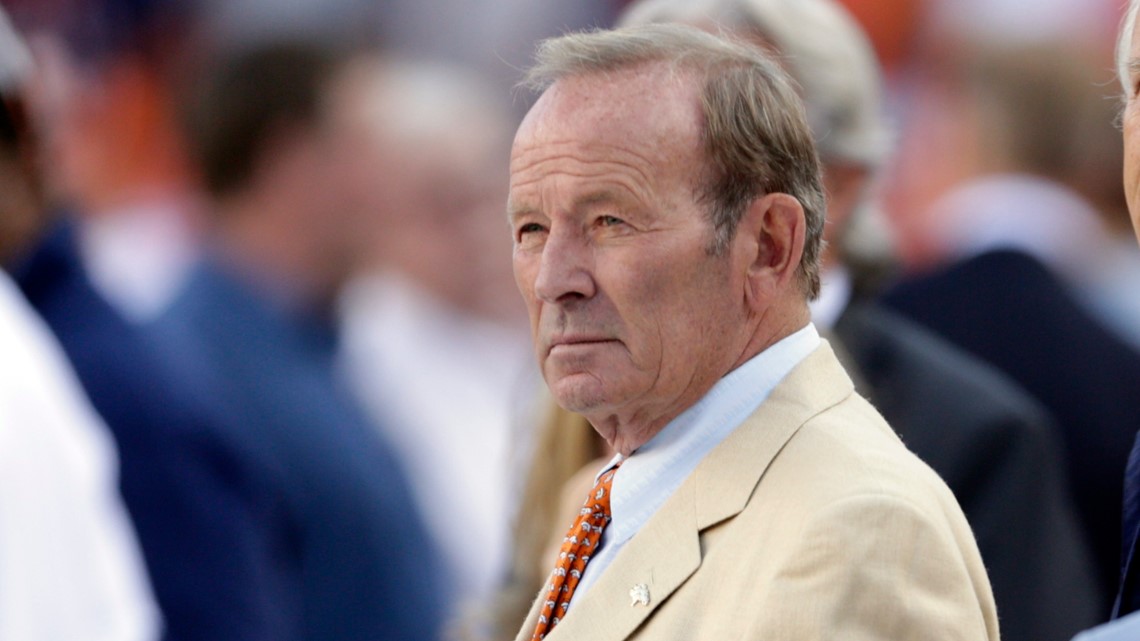
That $71 million total investment is now worth $2.7 billion, as most recently estimated by Forbes Magazine.
Bowlen eventually bought out his siblings’ majority interest so that he owned nearly 70 percent voting stock while his brother John owns an estimated 30 percent non-voting interest.
Pat Bowlen’s interest is now in his Pat Bowlen Trust. John Bowlen recently sold a portion of his minority interest to the Broncos. Another brother, Bill Bowlen, is suing the three trustees of the Pat Bowlen Trust – Ellis, team general counsel Rich Slivka and Pat Bowlen’s personal attorney Mary Kelly -- in hopes of putting other people in charge of his brother’s estate. Bill Bowlen’s lawsuit is currently pending in an Arapahoe County court while Pat Bowlen's ownership of the Broncos has been turned over to NFL arbitration.
During Bowlen’s active ownership tenure, there was overwhelming evidence he didn’t use the Broncos to build his own personal fortune. He reinvested into the franchise so that were always within 3 to 5 percent of the payroll cap (the 3 to 5 percent was held back in reserve to replace players that fell on injured reserve). He contributed more than $150 million for the team’s stadium construction, plus another $30 million in recent improvements.
He moved the team’s headquarters in 1990 to Dove Valley and recently made $38 million in enhancements, including the Pat Bowlen Fieldhouse at UCHealth Training Center.
And the Denver Broncos Charities have donated more than $25 million to various groups since 1993.
But Bowlen always considered his ultimate civic duty was bringing a Super Bowl contender to Denver.
“I couldn’t tell you I thought it was going to become what it is,’’ Bowlen told the Denver Post in August 2013. “When you get into this business at an age when you’re a lot younger than I am now, you don’t really know what you’re doing. It takes you a while to adjust. To me it was a real challenge. It was a fun deal. You have your disappointments. You have your losses and your wins. When you come in and buy a football team you don’t really understand the picture until you’re there for a while.’’
Perhaps, but he was vibrant owner from the start, in more ways than one. In February 1984, one month before his purchase of the Broncos became official, Bowlen finished 135th out of 1,100 entrants in the Ironman Triathlon in Hawaii, where he has a home at the base of Diamond Head on Oahu.
“We would go on trips and he would get off at the airport and run to our hotel,” Reeves said, laughing at the memory. “He was in such great shape and that was good for our players, to have an owner like that. Hell, he could outlast any of them.”

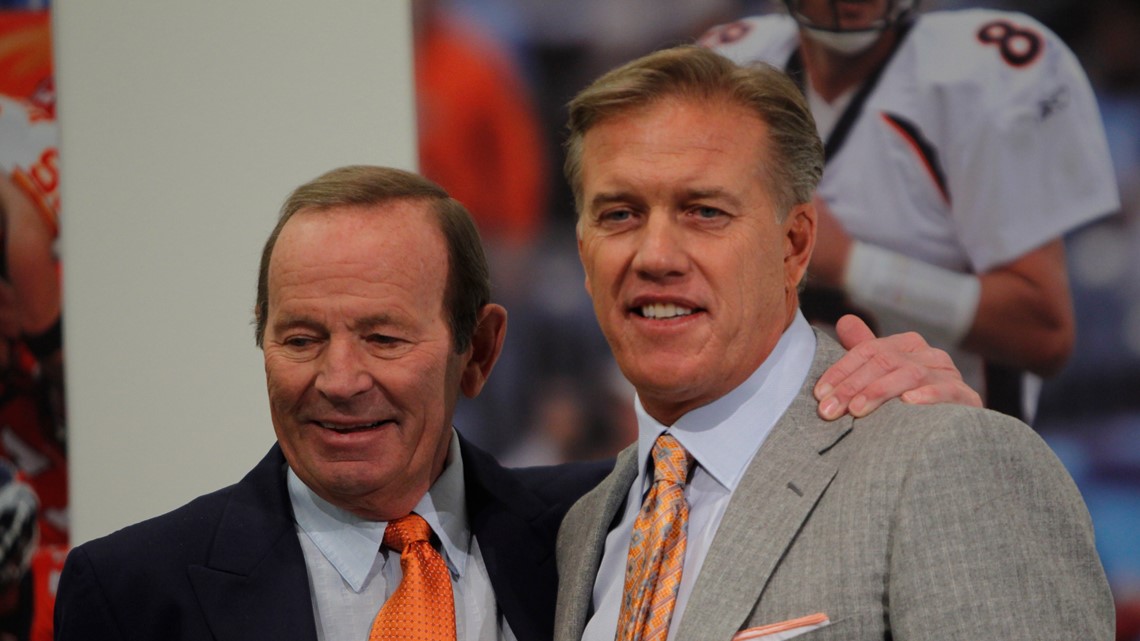
In 1999, after John Elway retired as a player, Bowlen reportedly offered his favorite quarterback an option to buy 10 percent of the principal stock in the team. That deal hit a serious snag. A condition of Kaiser’s sale to Bowlen – which would later be disputed for nearly a decade in the court system – was that Kaiser would have right of first refusal if Bowlen ever tried to sell off a portion of that majority interest.
When Bowlen tried to make Elway a partner, Kaiser sued, claiming he was not offered right first refusal.
The courts ruled in Kaiser’s favor in 2004 but Bowlen appealed and won in October 2008. Kaiser died in January 2012. Elway never did get the chance to buy the 10 percent but in one of Bowlen’s final decisions as owner, he hired Elway in January 2011 to take control of the Broncos’ football operations department.
Simultaneously, Bowlen took a step back from day-to-day operations and handed final-say authority of his club to Ellis, who was promoted from COO to president.
When Bowlen formally relinquished control of the team in July 2014, Ellis was promoted again, this time to chief executive officer.
Pat Bowlen’s preference as stated in his trust is that trustees Ellis, Slivka and Kelly select one of Pat Bowlen’s seven children to become the Broncos’ new owner. Officially, Ellis has repeatedly said there is no depth chart or batting order as to which child is next in line, although Bowlen’s death is expected to magnify the issue of his heir apparent. Brittany Bowlen and Beth Bowlen-Wallace have both said they would like to one day replace their father as the Broncos’ principal owner.
The expectation is Ellis would continue to run the team’s day-to-day operations for at least through the league reaches a new collective bargaining agreement in 2021. However, Ellis also said at the NFL owner's meetings in March that Brittany would return to work in a Broncos' executive position later this year.
Whoever is picked to sit behind Bowlen’s desk, it will not be easy, maybe even impossible, for him or her to match their father’s success. Pat Bowlen was simply the best owner in Denver sports history.
His management style was to show up at the office every day, and make sure every decision came through his desk. Yet he balanced this active role with not interfering with people from doing their job, particularly on the football side of team operations.
“You knew who you were working for,” Reeves said. “But all he wanted to do was reinforce to you that he would do whatever you needed.”
> Join us on KTVD Ch. 20 on Tuesday, June 18 at 7 p.m. for a special look back at Pat Bowlen's legacy.

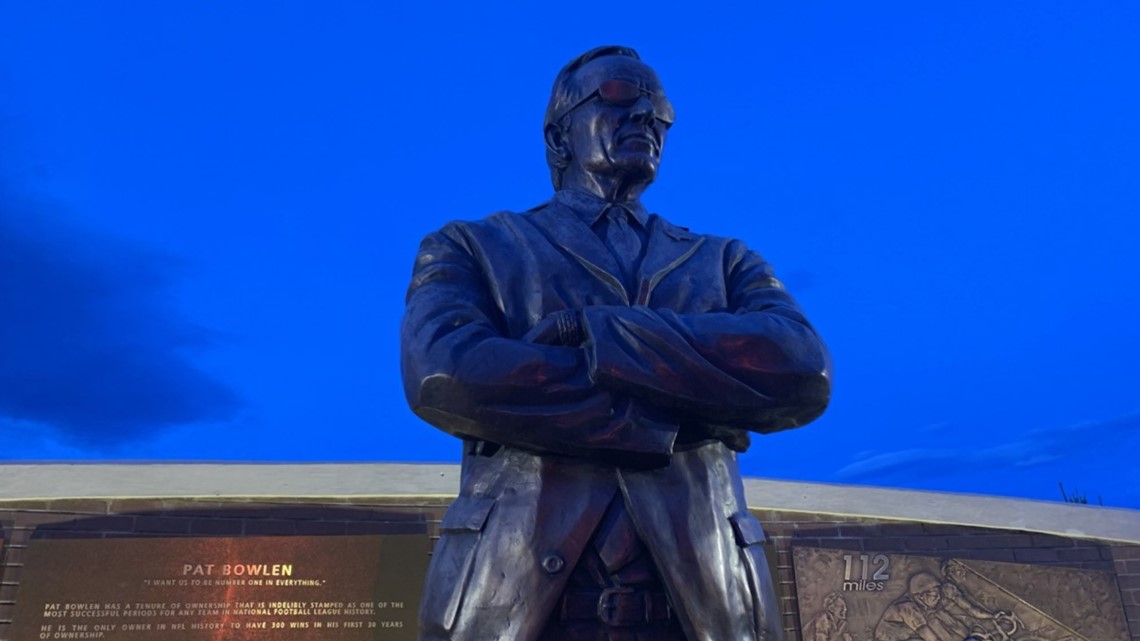
Bowlen File
- Only NFL owner to win 300 games within 30 years.
- No single owner has been to more Super Bowls than Bowlen with seven.
- Only 7 losing seasons in 35 seasons. Won second-most in that span (354).
- Served on 7 league committees. Co-Chair on NFL Management Council Executive Committee; chairman of NFL Broadcasting Committee.
- Eight international games in 6 countries.
- Opened the new Broncos Stadium at Mile High in 2001, first of eight new NFL stadiums built in three-year span.
- Every home game has been sold out.
- Donated more than $25 million to charity in 20-year period from 1994-2014.


RELATED: ‘Inspiration for Coloradans:’ Alzheimer’s Association releases statement after Pat Bowlen’s death



